In this guide, you’ll learn how to Install Power BI Desktop through the new Microsoft Store in Intune. The present discourse aims to elucidate the process of installing the Power BI Desktop application using Intune.
There are multiple ways to install any application using Intune. But what would make it different when you install the application from the New Microsoft Store in Intune? The Windows App simplifies access to the Windows experience by replacing the Azure Virtual Desktop and Windows 365 apps. Also, Intune automatically keeps the Microsoft Store applications up to date when a new version becomes available. This feature ensures that applications are always up-to-date and reduces the risk of security vulnerabilities.
The Windows Package Manager (Winget.exe) implements the new Microsoft Store app type. This app type features an expanded catalogue of apps, including both UWP and Win32 apps. It also supports desktop apps packaged in .msix and Win32 apps packaged in .exe or .msi installers.
The Windows application is available for a variety of devices, including those operating on Windows, macOS, iOS, iPadOS, and web browsers. For Windows 10/11 PCs, the new Windows application is accessible for download through the Microsoft Store
- Microsoft Store for Business Apps will be Deleted Soon
- Delete Microsoft Store for Business App from Intune
- Microsoft Store for Business Education Retirement Updates
Prerequisites and Improvements of New Microsoft Store Applications
We have discussed of the Microsoft Store app type. It’s worth noting that to use the Microsoft Store apps, some prerequisites must be met. As per Microsoft, we need to ensure the following prerequisites are met
- Client devices must have at least two core processors.
- Client devices must support Intune Management Extension (IME) for installation of Microsoft Store apps.
- The client device needs access to both the Microsoft Store and the target content.
Also, Microsoft has made significant improvements in the new Microsoft Store app functionality compared to the legacy version. Big shoutout to Microsoft for making our workday a little bit easier.
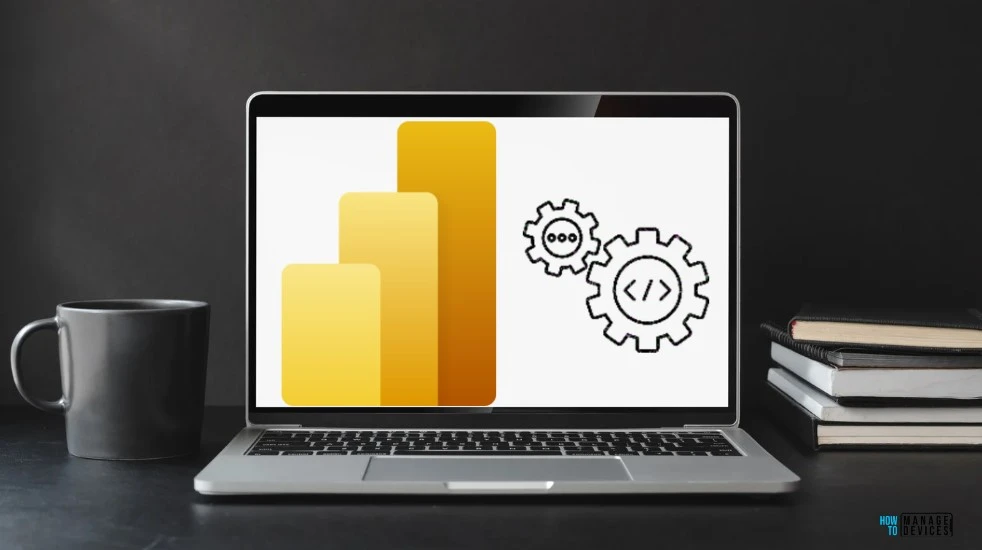
- You can browse and search for store apps within Intune
- You can install and uninstall with required app deployments
- You can monitor the installation progress and results for store apps
- Win32 store apps are supported (in preview)
- System context and user context are supported for UWP apps
Advantages of using Power BI
I will install the PowerBI Desktop application in this example through the new Microsoft Store in Intune. Many of my readers may be new to PowerBI and may not have used the PowerBI Desktop application before, I will provide a comprehensive overview of the PowerBI and Its advantages.
The PowerBI has many advantages that would attract you to use it daily to create many reports. One of its primary advantages is its ability to manage large volumes of data while maintaining performance and scalability. Also, we have seamless integration with other Microsoft products, making it an ideal choice for organizations seeking to enhance their reporting capabilities. You already would have integrated the PowerBI with SCCM to create SCCM reports.
Power BI is indeed a great solution for managing and analyzing data. Its feature-rich platform, ease of use, and versatility make it a highly recommended tool for businesses and academic institutions. Using Power BI, organizations can effectively manage and analyze their data in a cost-effective and efficient way, which is crucial for staying competitive in today’s data-driven world.
There are many advantages to creating reports using Power BI. Let us discuss the main advantages below.
- It creates a deeper insight
- Artificial Intelligence
- Help to analyze data
- It allows Excel integration
- It can be shared with Business professionals
- It connects to different sources of data
- The data is to be visualized in many ways
- It allows customizable dashboards
- It is a free application
- It gives effective reports based on data
- Integrate Power BI with Intune and Create Reports using Power BI
- How to Install and Use Microsoft Power BI Desktop
Install Power BI Desktop from the New Microsoft Store
Let’s learn how to install Power BI Desktop from the New Microsoft Store in Intune.
- Sign in to the Microsoft Intune Admin portal.
- Select Apps > All Apps> Add.

On the Select app type pane, select Microsoft Store app (new) Intune application type from the drop-down menu and click Select. After clicking on the Select button, you will see a list of new apps from the Microsoft Store. These apps are based on Windows Package Manager (Winget.exe).
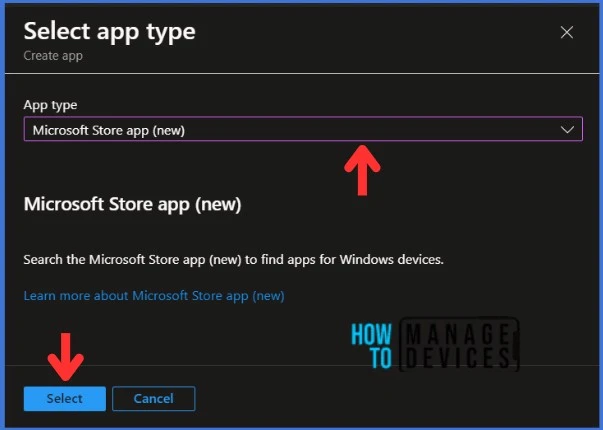
Click on the Search the Microsoft Store App (New) link to display the search panel, which features a search bar.
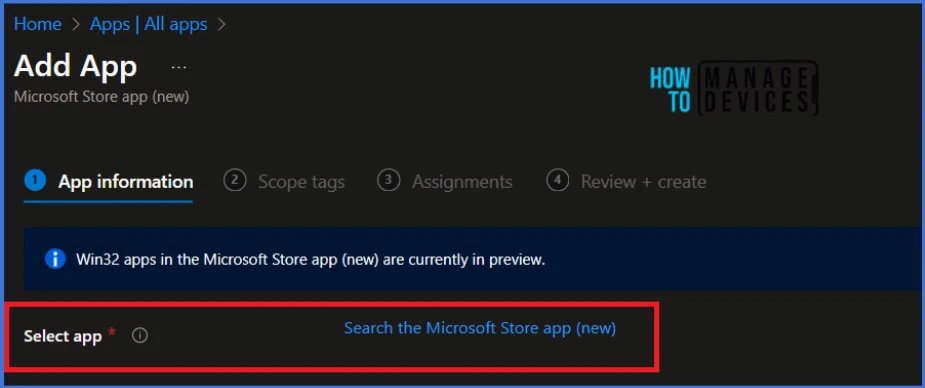
NOTE! Win32 apps in the Microsoft Store app (new) are currently in preview.In the search bar, type the name of the application that you want to install. I will search for Power BI Desktop in this example. You can search the applications only by their name. Click Select to continue.
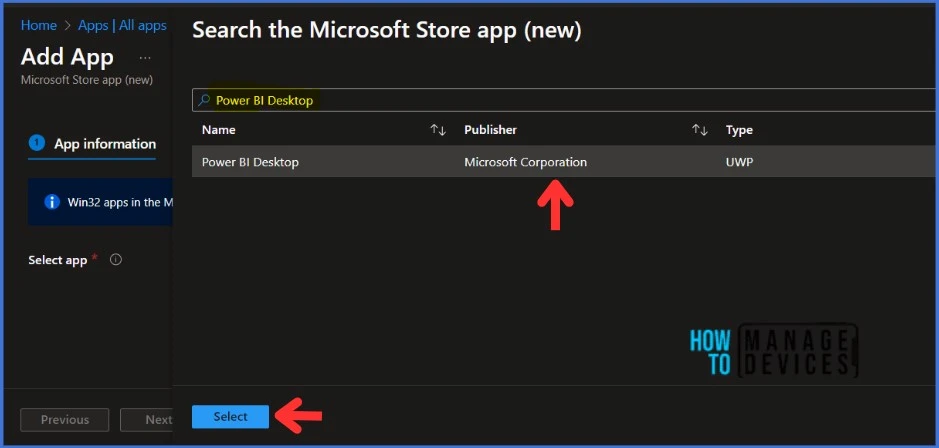
Once you click on the Select button, you will get details of the application.
| Name of the Field | Description |
|---|---|
| Name | The app’s name is prepopulated from the store’s metadata, and you can edit the field. |
| Description | The app’s Description is prepopulated from the store’s metadata, and you can edit the field. |
| Publisher | The app’s Publisher is prepopulated from the store’s metadata, and you can edit the field. |
| Package Identifier | The app’s unique ID is in the Microsoft Store. |
| Installer Type | The installer type of the application package is the UWP or Win32 installer types |
| Install behavior | The install behaviour of the app. If the app to be installed has the option of either System or User install behaviours, you must ensure that the installation works on devices as expected. NOTE: The specific store application only supports the selected install behaviour if the option is greyed out. |
| Category | Optionally, select one or more of the built-in app categories or a category you created. |
| Show this as a featured app in the Company Portal | Display the app prominently on the main page of the company portal when users browse for apps. |
| Information URL | Optionally, enter the URL of a website that contains information about this app. The URL appears in the company portal. |
| Privacy URL | Optionally, enter the URL of a website that contains privacy information for this app. The URL appears in the company portal. |
| Developer | Optionally, enter the name of the app developer. |
| Owner | Optionally, enter a name for the owner of this app. An example is HR department. |
| Notes | Enter any notes that you want to associate with this app. |
| Logo | Optionally, enter a name for the owner of this app. An example is the HR department. |
The information related to the application is displayed along with the metadata of the chosen app. The above table shows the fields that are supported. As always, Thanks to Microsoft for the table.
NOTE : As per Microsoft, Specific Microsoft Store apps may not be displayed and available in Intune. Common reasons an app doesn't appear when searching within Intune include the following:
The app is not available in your region
The app is not available if there is an age restriction
The app is a paid app, which is not supported
The app is an Android app
The app is a Microsoft Store for Business app that is not available publicly in the consumer storePlease make any necessary changes to the application’s data, if required. Once done, click on the Next button to continue.
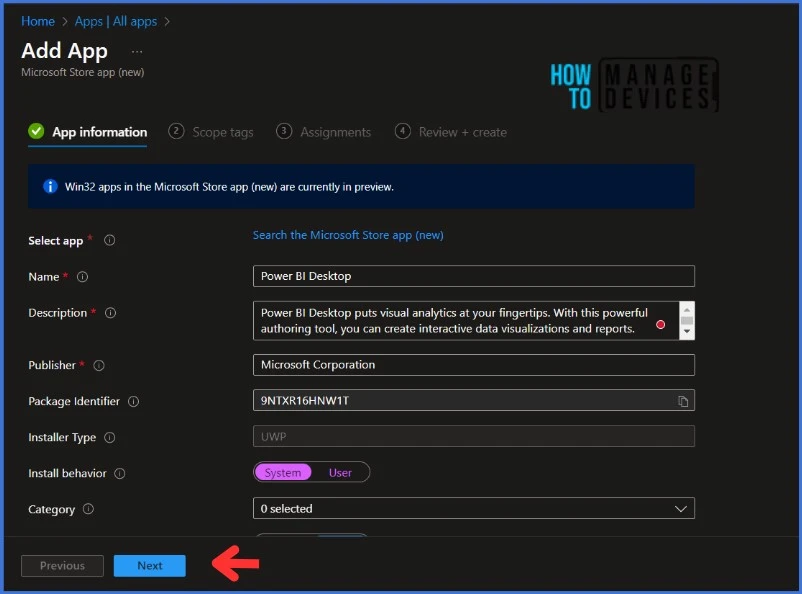
- Easy Steps to Configure the Company Portal Icon of an Application
- Intune Company Portal App Installation from New Microsoft Store | WinGet
Click Next to display the Scope tags page. Add the Scope tags if you wish and click Next to assign the policy to computers. I will deploy it to the HTMD – Test Computers Group.
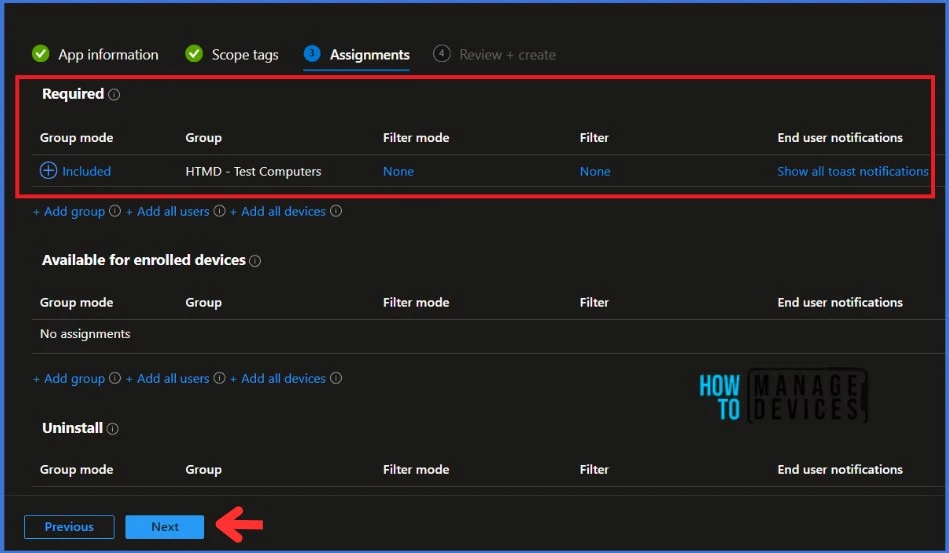
On the Review + Create page, carefully review all the settings you’ve defined for Power BI Desktop installation. Once you’ve confirmed that everything is correct, select Create to implement the changes.
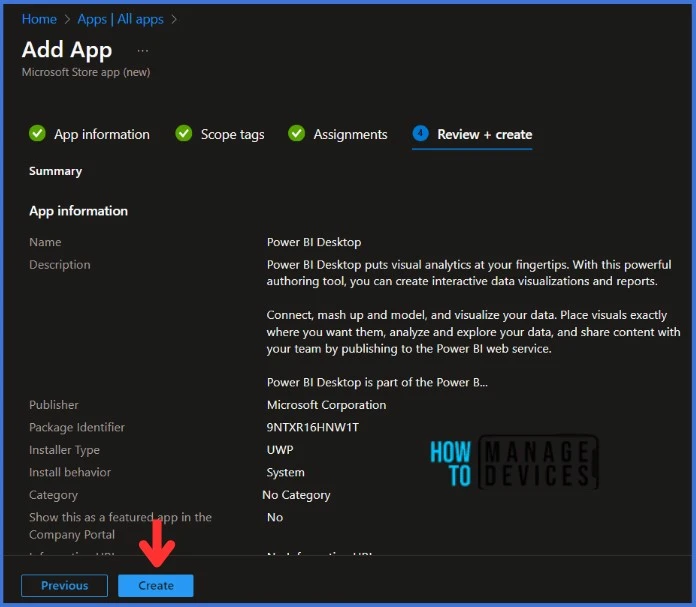
Monitor the New Microsoft Store App Deployment in Microsoft Intune
The Power BI Desktop is deployed to Azure AD groups. The installation should take place as soon as possible on the client device Since it’s deployed in Required mode.
The installation status can be monitored from the Intune portal. Let’s see how we can monitor the deployment and status of installation from the Intune portal.
- Select Apps > All Apps and enter the name of the application in the search bar
The Intune portal displays the recently created application. Select the desired application and click Overview. You can view a detailed report of recent app deployments, including information on whether the app is Installed, Not Installed, Failed, Install Pending or Not Applicable.
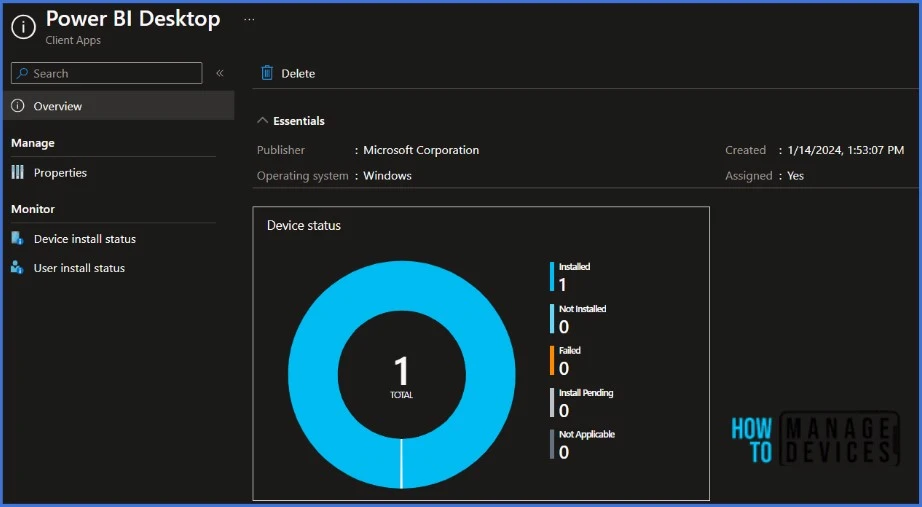
End-User Experience – Power BI Desktop Installation from New Microsoft Store
The app will be automatically installed after deploying the Power BI Desktop to workstations since it was marked as a required deployment. You may wonder how to monitor the deployment from the client side.
Open the Company Portal on the workstation and navigate to Download & Updates. You can see the Power BI Desktop application as installed.
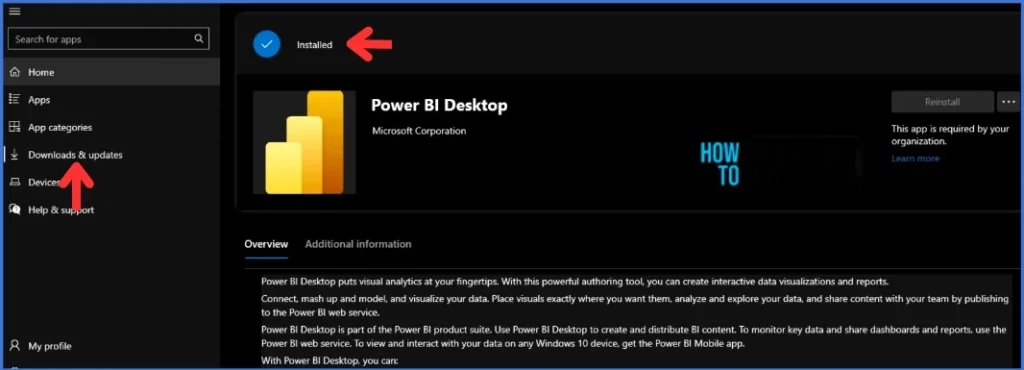
Thank you for your patience in reading this post. See you in the next post. Keep supporting the HTMD Community.
We are on WhatsApp. To get the latest step-by-step guides and news updates, Join our Channel. Click here – HTMD WhatsApp.Author
About Author – Sujin Nelladath has over 10 years of experience in SCCM device management and Automation solutions. He writes and shares his experiences related to Microsoft device management technologies, Azure, and PowerShell automation.
